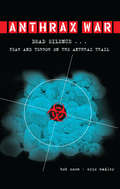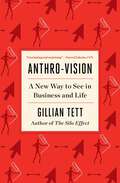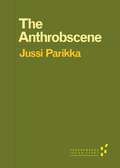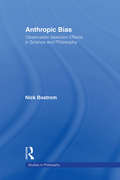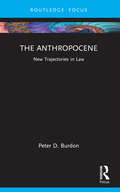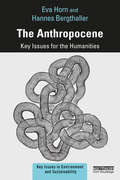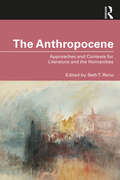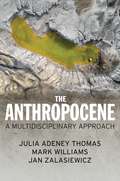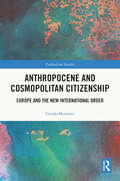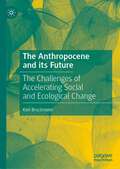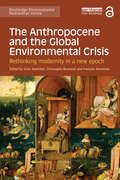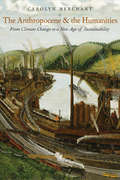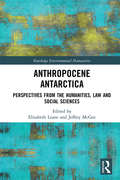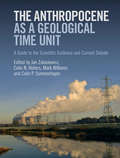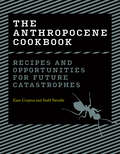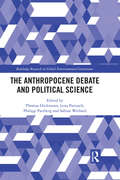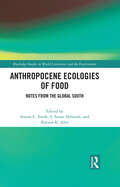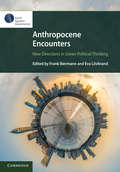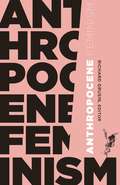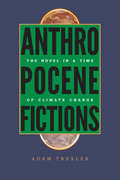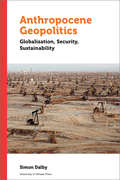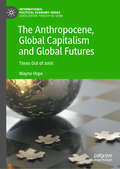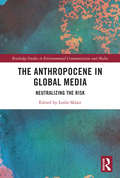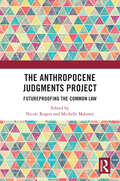- Table View
- List View
The Anthrax Vaccine: Is It Safe? Does It Work?
by Lois M. Joellenbeck Lee L. Zwanziger Jane S. Durch Brian L. StromThe vaccine used to protect humans against the anthrax disease, called Anthrax Vaccine Adsorbed (AVA), was licensed in 1970. It was initially used to protect people who might be exposed to anthrax where they worked, such as veterinarians and textile plant workers who process animal hair. When the U. S. military began to administer the vaccine, then extended a plan for the mandatory vaccination of all U. S. service members, some raised concerns about the safety and efficacy of AVA and the manufacture of the vaccine. In response to these and other concerns, Congress directed the Department of Defense to support an independent examination of AVA.The Anthrax Vaccine: Is It Safe? Does It Work? reports the study’s conclusion that the vaccine is acceptably safe and effective in protecting humans against anthrax. The book also includes a description of advances needed in main areas: improving the way the vaccine is now used, expanding surveillance efforts to detect side effects from its use, and developing a better vaccine.
Anthrax War: Dead Silence . . . Fear and Terror on the Anthrax Trail
by Bob Coen Eric NadlerAn investigation into the 2001 U.S. anthrax attacks leads to the realization that a new and terrible arms race may soon be upon us, one that spans the globe and is driven by an array of forces working with deadly microorganisms. Penetrating what they regard as an international "bioweapons mafia," Bob Coen and Eric Nadler encounter scientists, capitalists, politicians, and assassins — all playing with the world's most dangerous germs.Coen and Nadler pursue leads across four continents in an attempt to illuminate the secret world of international biological weapons research. They probe the mysterious deaths of some of the world's leading germ war scientists, including the death of Bruce Ivins — the man the FBI controversially insists is the lone perpetrator of the anthrax attacks. They also examine the suspicious suicide of British scientist and weapons inspector David Kelly, who was found dead in the woods the same week U.K. officials killed an investigation into illegal human experimentation at the top–secret facility where he once worked.As the plot darkens, it becomes clear that the 2001 anthrax attacks are a portal into a new and lucrative "biomilitary–industrial complex," and one of the most frightening stories of our time.
Anthro-Vision: A New Way to See in Business and Life
by Gillian TettIn an age when the business world is dominated by technology and data analysis, award-winning financial journalist and anthropology PhD Gillian Tett presents a radically different strategy for success: businesses can revolutionize their understanding of behavior by studying consumers, markets, and organizations through an anthropological lens. Amid severe digital disruption, economic upheaval, and political flux, how can we make sense of the world? Leaders today typically look for answers in economic models, Big Data, or artificial intelligence platforms. Gillian Tett points to anthropology—the study of human culture. Anthropologists train to get inside the minds of other people, helping them not only to understand other cultures but also to appraise their own environment with fresh perspective as an insider-outsider, gaining lateral vision. Today, anthropologists are more likely to study Amazon warehouses than remote Amazon tribes; they have done research into institutions and companies such as General Motors, Nestlé, Intel, and more, shedding light on practical questions such as how internet users really define themselves; why corporate projects fail; why bank traders miscalculate losses; how companies sell products like pet food and pensions; why pandemic policies succeed (or not). Anthropology makes the familiar seem unfamiliar and vice versa, giving us badly needed three-dimensional perspective in a world where many executives are plagued by tunnel vision, especially in fields like finance and technology. Lively, lucid, and practical, Anthro-Vision offers a revolutionary new way for understanding the behavior of organizations, individuals, and markets in today&’s ever-evolving world.
The Anthrobscene (Forerunners: Ideas First)
by Jussi ParikkaSmartphones, laptops, tablets, and e-readers all at one time held the promise of a more environmentally healthy world not dependent on paper and deforestation. The result of our ubiquitous digital lives is, as we see in The Anthrobscene, actually quite the opposite: not ecological health but an environmental wasteland, where media never die. Jussi Parikka critiques corporate and human desires as a geophysical force, analyzing the material side of the earth as essential for the existence of media and introducing the notion of an alternative deep time in which media live on in the layer of toxic waste we will leave behind as our geological legacy. Forerunners: Ideas First is a thought-in-process series of breakthrough digital publications. Written between fresh ideas and finished books, Forerunners draws on scholarly work initiated in notable blogs, social media, conference plenaries, journal articles, and the synergy of academic exchange. This is gray literature publishing: where intense thinking, change, and speculation take place in scholarship.
Anthropic Bias: Observation Selection Effects in Science and Philosophy
by Nick BostromAnthropic Bias explores how to reason when you suspect that your evidence is biased by "observation selection effects"--that is, evidence that has been filtered by the precondition that there be some suitably positioned observer to "have" the evidence. This conundrum--sometimes alluded to as "the anthropic principle," "self-locating belief," or "indexical information"--turns out to be a surprisingly perplexing and intellectually stimulating challenge, one abounding with important implications for many areas in science and philosophy. There are the philosophical thought experiments and paradoxes: the Doomsday Argument; Sleeping Beauty; the Presumptuous Philosopher; Adam & Eve; the Absent-Minded Driver; the Shooting Room. And there are the applications in contemporary science: cosmology ("How many universes are there?", "Why does the universe appear fine-tuned for life?"); evolutionary theory ("How improbable was the evolution of intelligent life on our planet?"); the problem of time's arrow ("Can it be given a thermodynamic explanation?"); quantum physics ("How can the many-worlds theory be tested?"); game-theory problems with imperfect recall ("How to model them?"); even traffic analysis ("Why is the 'next lane' faster?"). Anthropic Bias argues that the same principles are at work across all these domains. And it offers a synthesis: a mathematically explicit theory of observation selection effects that attempts to meet scientific needs while steering clear of philosophical paradox.
The Anthropocene: New Trajectories in Law (New Trajectories in Law)
by Peter D. BurdonThis book introduces the concept of the Anthropocene and examines its importance for environmental legal thinking, research and practice. Two main arguments are explored. The first is that much of the scholarship in environmental law that addresses the Anthropocene does not respond to Earth systems science or the difference in scale as we move from local to global systems. Key examples include a focus on anthropocentrism, attempts to constitutionalise environmental protections, the prevalence of legal rights and the idea of ecological integrity. The second argument is that these points of focus derive from the prevalence of idealism in environmental legal scholarship. Idealism in this context does not refer to naivety or the presentation of unrealistic goals. Rather, this book is concerned with idealism as a philosophical commitment to the power of ideas to determine reality and drive future change. As expressed in legal scholarship, this book also argues that idealism involves an abstraction from material reality and a refusal to directly engage those forces that have given rise to the Anthropocene. In response, this book uses a method of critique to uncover the presumptions and presuppositions that underlie environmental scholarship. As a counter to idealism, it also sketches out a framework for materialism in the Anthropocene. This book’s engagement with these questions will appeal to undergraduate and postgraduate students in law, politics, philosophy or the ecological humanities. It will also be of interest to academics in these disciplines and libraries around the world.
The Anthropocene: Key Issues for the Humanities (Key Issues in Environment and Sustainability)
by Eva Horn Hannes BergthallerThe Anthropocene is a concept which challenges the foundations of humanities scholarship as it is traditionally understood. It calls not only for closer engagement with the natural sciences but also for a synthetic approach bringing together insights from the various subdisciplines in the humanities and social sciences which have addressed themselves to ecological questions in the past. This book is an introduction to, and structured survey of, the attempts that have been made to take the measure of the Anthropocene, and explores some of the paradigmatic problems which it raises. The difficulties of an introduction to the Anthropocene lie not only in the disciplinary breadth of the subject, but also in the rapid pace at which the surrounding debates have been, and still are, unfolding. This introduction proposes a conceptual map which, however provisionally, charts these ongoing discussions across a variety of scientific and humanistic disciplines. This book will be essential reading for students and researchers in the environmental humanities, particularly in literary and cultural studies, history, philosophy, and environmental studies.
The Anthropocene: Approaches and Contexts for Literature and the Humanities
by Seth T. RenoPerhaps no concept has become dominant in so many fields as rapidly as the Anthropocene. Meaning "The Age of Humans," the Anthropocene is the proposed name for our current geological epoch, beginning when human activities started to have a noticeable impact on Earth’s geology and ecosystems. Long embraced by the natural sciences, the Anthropocene has now become commonplace in the humanities and social sciences, where it has taken firm enough hold to engender a thoroughgoing assessment and critique. Why and how has the geological concept of the Anthropocene become important to the humanities? What new approaches and insights do the humanities offer? What narratives and critiques of the Anthropocene do the humanities produce? What does it mean to study literature of the Anthropocene? These are the central questions that this collection explores. Each chapter takes a decidedly different humanist approach to the Anthropocene, from environmental humanities to queer theory to race, illuminating the important contributions of the humanities to the myriad discourses on the Anthropocene. This volume is designed to provide concise overviews of particular approaches and texts, as well as compelling and original interventions in the study of the Anthropocene. Written in an accessible style free from disciplinary-specific jargon, many chapters focus on well-known authors and texts, making this collection especially useful to teachers developing a course on the Anthropocene and students undertaking introductory research. This collection provides truly innovative arguments regarding how and why the Anthropocene concept is important to literature and the humanities.
The Anthropocene: A Multidisciplinary Approach
by Julia Adeney Thomas Jan ZalasiewiczHumans rank with the powerful forces of nature transforming Earth. Since the mid-20th century, population growth, industrialization, and globalization have had such deep and wide-ranging impacts that our planet no longer functions as it did during the previous eleven millennia. So distinctive is this collective human intervention that a new geological interval has been proposed; it is called the Anthropocene. The Anthropocene is intriguing scientifically, fascinating intellectually, and deeply disturbing politically, socially, economically, and ethically. We must learn how to co-exist sustainably with the rest of nature in what is emerging as a new planetary state. To do so, we must first understand what "Anthropocene" means in all its dimensions. This book adopts a multidisciplinary approach, starting with an exploration of the Anthropocene as a geological concept: ranging across the physical changes to the landscape, to the rapidly heating climate, to a biosphere undergoing transformation. And what of the "anthropos" in the Anthropocene? While geoscience does not normally address political and ethical issues of justice and equity, or economics and culture, Anthropocene studies in the humanities and social sciences investigate the complexities of the human activity driving global change. Here the book looks at human history, both in the deep past and more recently, the politics and economics of growth spurring the Anthropocene, and potential ways of mitigating its cruel effects. Our fragile, still beautiful, planet is finite. The new realities of the Anthropocene will need our best efforts, across disciplinary divides, at effective hope and action.
Anthropocene and Cosmopolitan Citizenship: Europe and the New International Order (Federalism Studies)
by Guido MontaniAnthropocene and Cosmopolitan Citizenship criticizes the Westphalia system of international relations and, as an alternative, proposes cosmopolitan citizenship. The book offers a critique of the theory of international relations based on the Westphalian system and the principle of national sovereignty.At the end of the Second World War, the two superpowers agreed on a new international order that, to this day, has prevented a new world war. This era is over. The collapse of the Soviet Union and the economic and political affirmation of new international powers – such as China, India and Brazil – have generated a multipolar world, in which growing tensions between great and small powers are manifested, up to the threat of nuclear war. To this threat, a second one has been added: the possible collapse of the biosphere, an epoch called the Anthropocene, because the pollution of nature is suffocating the life of every living species on the Planet, including Homo sapiens. The United Nations can be viewed as the first step towards a post-Westphalian system, and the European Union represents an alternative model for peaceful relationships among national peoples. The book’s methodology draws on an interdisciplinary relationship between social sciences and nature sciences to provide a European foreign policy strategy that shows how the European Union can play a crucial role in current international politics, helping build a just world in harmony with nature, including by calling for a Global Green Deal and an Earth Constitution. The integration of the national peoples of the European Union shows that supranational citizenship is possible and that national independence is compatible with peaceful international interdependence. The author explores how this can be achieved and how alternatives have failed, with reference to federalism, ecologism, liberalism, democracy, socialism, nationalism, security and patriotism.This book will be of interest to scholars of international relations and European studies and activists, including ecologists, young people, federalists and members of political parties.
The Anthropocene and its Future: The Challenges of Accelerating Social and Ecological Change
by Karl BruckmeierThis book analyses the complex social and ecological processes of the Great Acceleration, the Great Transformation, and sustainable development that shape the future of the global society in the twenty-first century. The first process takes place for a longer time, the second over the past thirty years, with attempts to build a sustainable economy and society in the global policy of sustainable development. The processes and their interaction will be discussed with knowledge from inter- and transdisciplinary transformation research, social and political ecology, and theories of modern society. The guiding theoretical concepts for the social-ecological transformation will be clarified: the concepts of acceleration, transformation, and sustainable development, and the societal and ecological processes they include. To obtain a more detailed picture of the changes in the global social-ecological system, different parts of the global transformation, the digital transformation, the transformation of food systems, and the transformation of modes of living in the social lifeworld are described to show the complex changes in the epoch of the Anthropocene more concretely. The global change processes in society and nature are caused by human forces but are difficult to control through policy and governance. With the interdisciplinary integration of concepts and knowledge, it becomes possible to provide a more detailed picture, of the difficulties to achieve a sustainable future society.
The Anthropocene and the Global Environmental Crisis: Rethinking modernity in a new epoch (Routledge Environmental Humanities)
by Clive Hamilton Christophe Bonneuil François GemenneThe Anthropocene, in which humankind has become a geological force, is a major scientific proposal; but it also means that the conceptions of the natural and social worlds on which sociology, political science, history, law, economics and philosophy rest are called into question. The Anthropocene and the Global Environmental Crisis captures some of the radical new thinking prompted by the arrival of the Anthropocene and opens up the social sciences and humanities to the profound meaning of the new geological epoch, the ‘Age of Humans’. Drawing on the expertise of world-recognised scholars and thought-provoking intellectuals, the book explores the challenges and difficult questions posed by the convergence of geological and human history to the foundational ideas of modern social science. If in the Anthropocene humans have become a force of nature, changing the functioning of the Earth system as volcanism and glacial cycles do, then it means the end of the idea of nature as no more than the inert backdrop to the drama of human affairs. It means the end of the ‘social-only’ understanding of human history and agency. These pillars of modernity are now destabilised. The scale and pace of the shifts occurring on Earth are beyond human experience and expose the anachronisms of ‘Holocene thinking’. The book explores what kinds of narratives are emerging around the scientific idea of the new geological epoch, and what it means for the ‘politics of unsustainability’.
The Anthropocene and the Humanities: From Climate Change to a New Age of Sustainability (The Future Series)
by Carolyn MerchantA wide-ranging and original introduction to the Anthropocene that offers fresh, theoretical insights bridging the sciences and the humanities From noted environmental historian Carolyn Merchant, this book focuses on the original concept of the Anthropocene first proposed by Paul Crutzen and Eugene Stoermer in their foundational 2000 paper. It undertakes a broad investigation into the ways in which science, technology, and the humanities can create a new and compelling awareness of human impacts on the environment. Using history, art, literature, religion, philosophy, ethics, and justice as the focal points, Merchant traces key figures and developments in the humanities throughout the Anthropocene era and explores how these disciplines might influence sustainability in the next century. Wide-ranging and accessible, this book from an eminent scholar in environmental history and philosophy argues for replacing the Age of the Anthropocene with a new Age of Sustainability.
Anthropocene Antarctica: Perspectives from the Humanities, Law and Social Sciences (Routledge Environmental Humanities)
by Elizabeth Leane Jeffrey McGeeAnthropocene Antarctica offers new ways of thinking about the ‘Continent for Science and Peace’ in a time of planetary environmental change. In the Anthropocene, Antarctica has become central to the Earth’s future. Ice cores taken from its interior reveal the deep environmental history of the planet and warming ocean currents are ominously destabilising the glaciers around its edges, presaging sea-level rise in decades and centuries to come. At the same time, proliferating research stations and tourist numbers challenge stereotypes of the continent as the ‘last wilderness.’ The Anthropocene brings Antarctica nearer in thought, entangled with our everyday actions. If the Anthropocene signals the end of the idea of Nature as separate from humans, then the Antarctic, long considered the material embodiment of this idea, faces a radical reframing. Understanding the southern polar region in the twenty-first century requires contributions across the disciplinary spectrum. This collection paves the way for researchers in the Environmental Humanities, Law and Social Sciences to engage critically with the Antarctic, fostering a community of scholars who can act with natural scientists to address the globally significant environmental issues that face this vitally important part of the planet.
The Anthropocene as a Geological Time Unit: A Guide to the Scientific Evidence and Current Debate
by Jan Zalasiewicz Colin N. Waters Mark Williams Colin SummerhayesThe Anthropocene, a term launched into public debate by Nobel Prize winner Paul Crutzen, has been used informally to describe the time period during which human actions have had a drastic effect on the Earth and its ecosystems. This book presents evidence for defining the Anthropocene as a geological epoch, written by the high-profile international team analysing its potential addition to the geological time scale. The evidence ranges from chemical signals arising from pollution, to landscape changes associated with urbanisation, and biological changes associated with species invasion and extinctions. Global environmental change is placed within the context of planetary processes and deep geological time, allowing the reader to appreciate the scale of human-driven change and compare the global transition taking place today with major transitions in Earth history. This is an authoritative review of the Anthropocene for graduate students and academic researchers across scientific, social science and humanities disciplines.
The Anthropocene Cookbook: Recipes and Opportunities for Future Catastrophes
by Zane Cerpina Stahl StenslieMore than sixty speculative art and design projects explore how art, food, and creative thinking can prepare us for future catastrophes.In the Age of the Anthropocene—a era characterized by human-caused climate disaster—catastrophes and dystopias loom. The Anthropocene Cookbook takes our planetary state of emergency as an opportunity to seize the moment to imagine constructive change and new ideas. How can we survive in an age of constant environmental crises? How can we thrive? The Anthropocene Cookbook answers these questions by presenting a series of investigative art and design projects that explore how art, food, and creative thinking can prepare us for future catastrophes. This cookbook of ideas rethinks our eating habits and traditions, challenges our food taboos, and proposes new recipes for humanity&’s survival. These more than sixty projects propose new ways to think and make food, offering tools for creative action rather than traditional recipes. They imagine modifying the human body to digest cellulose, turning plastic into food, tasting smog, extracting spices and medicines from sewage, and growing meat in the lab. They investigate provocative possibilities: What if we made cheese using human bacteria, enabled human photosynthesis through symbiosis with algae, and brought back extinct species in order to eat them? The projects are diverse in their creative approaches and their agendas—multilayered, multifaceted, hybrid, and cross-pollinated. The Anthropocene Cookbook offers a survival guide for a future gone rogue, a road map to our edible futures.
The Anthropocene Debate and Political Science (Routledge Research in Global Environmental Governance)
by Thomas Hickmann Lena Partzsch Philipp Pattberg Sabine WeilandAnthropocene has become an environmental buzzword. It denotes a new geological epoch that is human‐dominated. As mounting scientific evidence reveals, humankind has fundamentally altered atmospheric, geological, hydrological, biospheric, and other Earth system processes to an extent that the risk of an irreversible system change emerges. Human societies must therefore change direction and navigate away from critical tipping points in the various ecosystems of our planet. This hypothesis has kicked off a debate not only on the geoscientific definition of the Anthropocene era, but increasingly also in the social sciences. However, the specific contribution of the social sciences disciplines and in particular that of political science still needs to be fully established. This edited volume analyzes, from a political science perspective, the wider social dynamics underlying the ecological and geological changes, as well as their implications for governance and politics in the Anthropocene. The focus is on two questions: (1) What is the contribution of political science to the Anthropocene debate, e.g. in terms of identified problems, answers, and solutions? (2) What are the conceptual and practical implications of the Anthropocene debate for the discipline of political science? Overall, this book contributes to the Anthropocene debate by providing novel theoretical and conceptual accounts of the Anthropocene, engaging with contemporary politics and policy-making in the Anthropocene, and offering a critical reflection on the Anthropocene debate as such. The volume will be of great interest to students and scholars of political science, global environmental politics and governance, and sustainable development.
Anthropocene Ecologies of Food: Notes from the Global South (Routledge Studies in World Literatures and the Environment)
by Simon C EstokAnthropocene Ecologies of Food provides a detailed exploration of cross-cultural aspects of food production, culinary practices, and their ecological underpinning in culture. The authors draw connections between humans and the entire process of global food production focusing on the broad implications these processes have within the geographical and cultural context of India. Each chapter analyzes and critiques existing agricultural/food practices, and representations of aspects of food through various media (such as film, literature, and new media) as they relate to global issues generally and Indian contexts specifically, correcting the omission of analyses focused on the Global South in virtually all of the work that has been done on "Anthropocene ecologies of food." This unique volume employs an ecocritical framework that connects food with the land, in physical and virtual communities, and the book as a whole interrogates the meanings and implications of the Anthropocene itself.
Anthropocene Encounters: New Directions in Green Political Thinking
by Frank Biermann Eva LövbrandCoined barely two decades ago, the Anthropocene has become one of the most influential and controversial terms in environmental policy. Yet it remains an ambivalent and contested formulation, giving rise to a multitude of unexpected, and often uncomfortable, conversations. This book traces in detail a broad variety of such 'Anthropocene encounters': in science, philosophy and literary fiction. It asks what it means to 'think green' in a time when nature no longer offers a stable backdrop to political analysis. Do familiar political categories and concepts, such as democracy, justice, power and time, hold when confronted with a world radically transformed by humans? The book responds by inviting more radical political thought, plural forms of engagement, and extended ethical commitments, making it a fascinating and timely volume for graduate students and researchers working in earth system governance, environmental politics and studies of the Anthropocene.
Anthropocene Feminism (21st Century Studies)
by Richard GrusinWhat does feminism have to say to the Anthropocene? How does the concept of the Anthropocene impact feminism? This book is a daring and provocative response to the masculinist and techno-normative approach to the Anthropocene so often taken by technoscientists, artists, humanists, and social scientists. By coining and, for the first time, fully exploring the concept of &“anthropocene feminism,&” it highlights the alternatives feminism and queer theory can offer for thinking about the Anthropocene. Feminist theory has long been concerned with the anthropogenic impact of humans, particularly men, on nature. Consequently, the contributors to this volume explore not only what current interest in the Anthropocene might mean for feminism but also what it is that feminist theory can contribute to technoscientific understandings of the Anthropocene. With essays from prominent environmental and feminist scholars on topics ranging from Hawaiian poetry to Foucault to shelled creatures to hypomodernity to posthuman feminism, this book highlights both why we need an anthropocene feminism and why thinking about the Anthropocene must come from feminism. Contributors: Stacy Alaimo, U of Texas at Arlington; Rosi Braidotti, Utrecht U; Joshua Clover, U of California, Davis; Claire Colebrook, Pennsylvania State U; Dehlia Hannah, Arizona State U; Myra J. Hird, Queen&’s U; Lynne Huffer, Emory U; Natalie Jeremijenko, New York U; Elizabeth A. Povinelli, Columbia U; Jill S. Schneiderman, Vassar College; Juliana Spahr, Mills College; Alexander Zahara, Queen&’s U.
Anthropocene Fictions: The Novel in a Time of Climate Change (Under the Sign of Nature: Explorations in Ecocriticism)
by Adam TrexlerSince the Industrial Revolution, humans have transformed the Earth's atmosphere, committing our planet to more extreme weather, rising sea levels, melting polar ice caps, and mass extinction. This period of observable human impact on the Earth's ecosystems has been called the Anthropocene Age. The anthropogenic climate change that has impacted the Earth has also affected our literature, but criticism of the contemporary novel has not adequately recognized the literary response to this level of environmental crisis. Ecocriticism's theories of place and planet, meanwhile, are troubled by a climate that is neither natural nor under human control. Anthropocene Fictions is the first systematic examination of the hundreds of novels that have been written about anthropogenic climate change.Drawing on climatology, the sociology and philosophy of science, geography, and environmental economics, Adam Trexler argues that the novel has become an essential tool to construct meaning in an age of climate change. The novel expands the reach of climate science beyond the laboratory or model, turning abstract predictions into subjectively tangible experiences of place, identity, and culture. Political and economic organizations are also being transformed by their struggle for sustainability. In turn, the novel has been forced to adapt to new boundaries between truth and fabrication, nature and economies, and individual choice and larger systems of natural phenomena. Anthropocene Fictions argues that new modes of inhabiting climate are of the utmost critical and political importance, when unprecedented scientific consensus has failed to lead to action. Under the Sign of Nature: Explorations in Ecocriticism
Anthropocene Geopolitics: Globalization, Security, Sustainability (Politics and Public Policy)
by Simon DalbyWe now find ourselves in a new geological age: the Anthropocene. The climate is changing and species are disappearing at a rate not seen since Earth’s major extinctions. The rapid, large-scale changes caused by fossil-fuel powered globalization increasingly threaten societies in new, unforeseen ways. But most security policies continue to be built on notions that look backward to a time when geopolitical threats derived mainly from the rivalries of states with fixed boundaries. Instead, Anthropocene Geopolitics shows that security policy must look forward to quickly shape a sustainable world no longer dependent on fossil fuels. A future of long-term peace and geopolitical security depends on keeping the earth in conditions roughly similar to those we have known throughout history. Minimizing disruptions that would further put civilization at risk of extinction urgently requires policies that reflect new Anthropocene “planetary boundaries.” This book is published in English. - Depuis la fin de la dernière période glaciaire, l’humanité a transformé sa niche écologique, modifié sa position dans l’écosystème, provoqué des changements climatiques radicaux et affecté la diversité des espèces aux quatre coins du monde, ce qui a entraîné l’apparition d’une nouvelle époque géologique, l’Anthropocène. À l’échelle planétaire, les activités humaines exercent un impact direct sur les frontières qu’elles transforment durablement alors que ces mêmes frontières ont constitué le cadre naturel dans lequel l’humanité a pu prospérer durant les dix derniers millénaires. Les changements rapides qui affectent notre système terrestre remettent directement en cause les anciennes hypothèses qui considéraient des frontières stables comme le principal fondement de la souveraineté. Aujourd’hui, ces postulats périmés doivent impérativement être réévalués. Paradoxalement, la phase de mondialisation actuelle nécessite une redéfinition de la notion même de frontières stables. En effet, l’élargissement des droits de propriété et des champs de compétence pourrait en fait prévenir la mise en œuvre de mesures d’adaptation efficaces visant à répondre aux enjeux du changement climatique. Garantir la survie d’une économie fondée sur la consommation de combustibles fossiles demeure à ce jour une priorité politique comme le fait de devoir faire face aux catastrophes naturelles à l’échelle mondiale – ce qui rend les objectifs de durabilité d’autant plus difficiles à atteindre dans un environnement en pleine mutation où les rivalités politiques exacerbées façonnent la politique globale contemporaine. L’entrée de la Terre dans une nouvelle époque géologique, l’Anthropocène (l’ère de l’homme), représente un formidable défi éthique, qu’il convient de relever en établissant une véritable politique de durabilité, et ce, au moment où l’humanité s’engage dans la dernière phase du processus de mondialisation. Dans un tel contexte, pour être réellement efficaces, les connaissances et les perspectives résultant des analyses académiques et des initiatives pratiques de toute nature devront être intégrées dans une vision globale.
The Anthropocene, Global Capitalism and Global Futures: Times Out of Joint (International Political Economy Series)
by Wayne HopeThis book seeks to show that the Anthropocene epoch of the earth system has converged with the global epoch of capitalist history. Planetary warming and climate change are, therefore, unfolding rapidly. This enveloping process is driven forward by the mutual ruptures of a deteriorating earth system and fossil based global capitalism, as a fraught socioecological totality. Overlapping crises of time are the net result. They involve, the recurring, myopic volatility of financialised capitalism, the ecological impossibility of sustaining capitalist growth, the spreading arrhythmias of biotic, animal, bird, insect and marine life and the irremediable psychological stresses of climate change anxiety. The time crises of global capitalism originate from certain disjunctures of time associated with carbon extractivism, carbon emission markets and official climate change projections. The book sets out the counter constructions of time necessary to energise the climate justice movement and advance ecosocialist principles.
The Anthropocene in Global Media: Neutralizing the risk (Routledge Studies in Environmental Communication and Media)
by Leslie SklairThis book offers the first systematic study of how the ‘Anthropocene’ is reported in mass media globally, drawing parallels between the use (or misuse) of the term and the media’s attitude towards the associated issues of climate change and global warming. Identifying the potential dangers of the Anthropocene provides a useful path into a variety of issues that are often ignored, misrepresented, or sidelined by the media. These dangers are widely discussed in the social sciences, environmental humanities, and creative arts, and this book includes chapters on how the contributions of these disciplines are reported by the media. Our results suggest that the natural science and mass media establishments, and the business and political interests which underpin them, tend to lean towards optimistic reassurance (the ‘good’ Anthropocene), rather than pessimistic alarmist stories, in reporting the Anthropocene. In this volume, contributors explore how dangerous this ‘neutralizing’ of the Anthropocene is in undermining serious global action in the face of the potential existential risks confronting humanity. The book presents results from media in more than 100 countries in all major languages across the globe. It covers the reporting of key environmental issues, such as the impact of climate change and global warming on oceans, forests, soil, biodiversity, and the biosphere. We offer explanations for differences and similarities in how the media report the Anthropocene in different regions of the world. In doing so, the book argues that, though it is still controversial, the idea of the Anthropocene helps to concentrate minds and behaviour in confronting ongoing ecological (and Coronavirus) crises. The Anthropocene in Global Media will be of interest to students and scholars of environmental studies, media and communication studies, and the environmental humanities, and all those who are concerned about the survival of humans on planet Earth.
The Anthropocene Judgments Project: Futureproofing the Common Law
by Nicole Rogers and Michelle MaloneyThis book is a collection of speculative judgments that, along with accompanying commentaries, pursue a novel enquiry into how judges might respond to the formidable and planetary-scaled challenges of the Anthropocene. The book’s contributors –from Australia, Asia, Europe, and the United Kingdom –take up a range of issues: including multispecies justice, the challenges of intergenerational justice, dimensions of postcolonial justice, the potential contribution of AI platforms to the judgment process, and the future of judging and law in and beyond the Anthropocene. The project takes its inspiration from existing critical judgment projects. It is, however, thoroughly interdisciplinary. In anticipating future scenarios, and designing or adapting legal principles to respond to them, the book’s contributors have been assisted by climate scientists with expertise in future modelling; they have benefitted from the experience of fiction writers in future worldbuilding; and they have incorporated elements of the future worlds depicted in various texts of speculative fiction and artworks. The judgments are, of necessity, speculative and hypothetical in their subject matter. Thus, taken together, they constitute a collaborative experiment in creating the inclusive and radical imaginaries of the future common law. The Anthropocene Judgments Project will appeal to critical and sociolegal academics, scholars in the environmental humanities, environmental lawyers, students, and others with interests in the pressing issues of ecology, multispecies justice, climate change, the intersection of AI platforms and the law, and the future of law in the Anthropocene.

